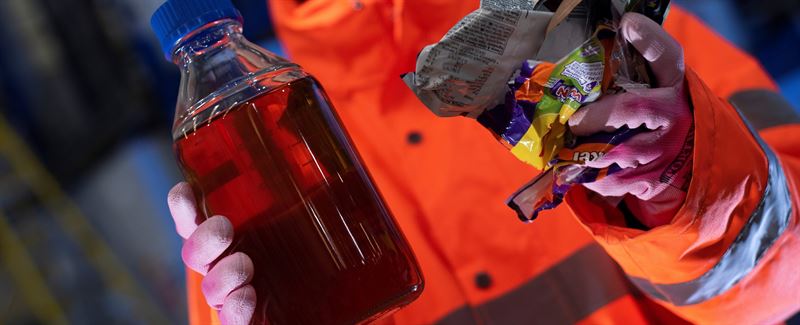 Neste, the world's leading supplier of renewable diesel and aviation fuel and a pioneer in renewable and circular chemicals; Recycling Technologies, a specialist in plastics recycling technology; and Unilever, the consumer goods manufacturer with leading global brands, are collaborating to develop and exploit chemical recycling to recover and recycle plastic packaging that is currently either incinerated, landfilled or exported from the UK.
Neste, the world's leading supplier of renewable diesel and aviation fuel and a pioneer in renewable and circular chemicals; Recycling Technologies, a specialist in plastics recycling technology; and Unilever, the consumer goods manufacturer with leading global brands, are collaborating to develop and exploit chemical recycling to recover and recycle plastic packaging that is currently either incinerated, landfilled or exported from the UK.
A joint project between these three global leaders is receiving a £3.1 million grant from UK Research and Innovation (UKRI). The aim is to develop a chemical recycling process that will make plastic packaging that is difficult to recycle recoverable by combining the expertise of these world leaders in their respective fields
As part of this three-year project, Recycling Technologies is using its recycling facilities to process waste plastics into an oil called Plaxx. Neste tests and analyses its quality and suitability for refining it into high-quality drop-in starting material for the production of new plastics. These can be processed into plastic packaging, for example, which is equivalent in quality to crude oil-based material. Unilever brings additional expertise to the already established cooperation between Recycling Technologies and Neste, which concerns the design of packaging with a view to its recyclability.
The grant will contribute to the refinement of test methods and other improvements to the chemical recycling plant that Recycling Technologies is currently building at Binn Farm in Perthshire, Scotland. The new cooperation will enable the company to optimise its systems for processing waste plastics and to refine the Plaxx so that Neste can easily process it into a raw material for the production of new plastics in its own facilities. The partnership will result in applications for end-of-life plastics such as films, bags and pouches that are difficult to recycle. They will become raw material for the production of new packaging.
Neste has extensive experience in handling low-quality waste and residual materials, for example renewable oils and fats, and processing them into high-value products such as raw materials for polymer and chemical production. Neste, together with several partners, is committed to developing scalable solutions to accelerate the recycling of plastics and aims to introduce liquefied plastic waste as raw material for its own refineries. They will replace fossil oil in the production of feedstock for new plastics. Through its collaboration with Recycling Technologies, Neste is able to drive the development of one of the promising chemical recycling technologies.
"We are particularly pleased that Unilever is participating in this project, which builds on our existing collaboration with Recycling Technologies," added Mercedes Alonso, Executive Vice President, Renewable Polymers & Chemicals at Neste. "UKRI's funding for this groundbreaking joint project will accelerate the development of chemical recycling. It will enable us project partners to gather new data on how recycling-oriented design can best contribute to increasing the recycling rates of packaging waste that cannot be recycled at present. Joint efforts such as these across the entire plastics value chain are key to accelerating the transition to a closed-loop plastics economy".
Sebastian Munden, Executive Vice President of Unilever UK & Ireland, said: "We are delighted to be part of this joint project with Recycling Technologies and Neste to develop a solution for plastics such as film and flexible packaging that are currently difficult to recycle. As part of this collaboration, we have committed ourselves to examining the design of our products to see how they can be better recycled and the extent to which the recycled material can be reused in our packaging, which would also create an end market and therefore a value for the material. Unilever is committed to halving the amount of virgin plastic we use in our packaging by 2025, including through the use of recycled plastics. Cooperation between partners and industry experts is so important because together we can develop innovative solutions that are effective and scalable.
www.neste.com


















































































